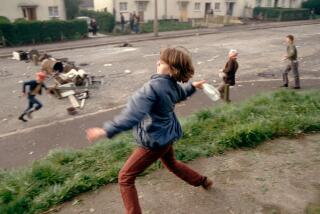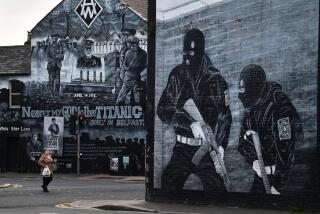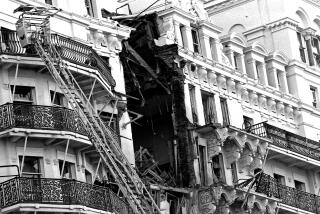A Climate of Complicity for a Murder in Ulster
- Share via
BELFAST, Northern Ireland — Fifteen-year-old Michael Finucane was greeting mourners, describing how his family was sitting down to their evening meal when they heard the hall door being kicked in by three men.
As his father, Patrick Finucane, got up to go to the kitchen door, one of the killers fired a machine gun through its glass panels. Finucane, 38, one of Belfast’s outstanding human-rights lawyers, fell to the floor.
“I didn’t know whether to try to do something to stop them or to protect my brother and sister,” Michael Finucane said. “I pulled them both under the kitchen table. The man came through the door and shot him several more times.” Michael pointed to his stomach and head to indicate where his father had been shot. The three gunmen then escaped in a stolen car driven by a fourth man.
The Ulster Defense Assn.’s death squad, the Ulster Freedom Fighters, has boasted of the Feb. 12 killing. But both the moral and political responsibility lies directly with the government of British Prime Minister Margaret Thatcher and particularly with Douglas Hogg, a junior Home Office minister who recently asserted in Westminster that “certain solicitors” were “unduly sympathetic” to the Irish Republican Army. Hogg repeated this dangerous and unspecified allegation 11 times in the course of a House of Commons debate in January, making it clear that the British intelligence service was the source for his comments.
Seamus Mallon, a moderate nationalist member of Parliment, challenged Hogg to withdraw the allegation, saying that if others did with weapons what the minister had done with words, the British government would have blood on its hands. Hogg, though, refused.
After the assassination, the Irish Times, a national daily out of Dublin, reported allegations that Finucane’s death was orchestrated by the security forces. “Loyalist sources have claimed that members questioned by the RUC (the Royal Ulster Constabulary) had been told . . . that Mr. Finucane and other Catholic solicitors were helping to keep the IRA out of prison.” The same paper later reported that the Ulster Freedom Fighters had issued death threats against three more Catholic lawyers.
Belfast lawyers are taking these death threats very seriously. The Irish Times has reported collusion between the Royal Ulster Constabulary, 98% of its force being Protestant, and thugs like the Ulster Freedom Fighters. Irish Prime Minister Charles Haughey has called for Hogg’s resignation, only to be ignored by the British government. So it is particularly important for American lawyers, bar associations and media to condemn this British complicity and complacency.
Both Patrick Finucane and his wife Geraldine, who was wounded in the attack, had many close friends in the United States, dating to 1981 when he was representing the H-Block hunger strikers.
Yet Pat Finucane represented republicans and loyalists with equal dedication. He earned the respect and friendship of human-rights lawyers in both the United States and Europe by winning important legal battles on behalf of detainees, prisoners and victims of gross police misconduct.
He was one of the very few lawyers prepared to mount creative and effective legal challenges to the abuses of British repression in Northern Ireland. He was such a danger to their system of injustice that he was singled out for the assassin’s gun.
Amid the focus on the British government’s indignation over the Salman Rushdie affair, the American press has largely ignored Finucane’s assassination and the role of the Thatcher government in creating the climate for that murder. There is only one difference between the effects of the fulminations of the Ayatollah Ruhollah Khomeini and the insinuations of the British minister--to date, Salman Rushdie is still alive.
Finucane’s funeral was a demonstration of respect for this man and his family. Lawyers and politicians from both parts of Ireland, as well as Britain, France and the United States, attended. The church overflowed with 1,000 mourners who, after the service, followed the cortege to the cemetery on the Falls Road. People who lined the route swelled the numbers to more than 2,000 at the graveside.
We owe it to Patrick Finucane, his family and to the embattled law profession in Northern Ireland to ensure a thorough investigation of his death and to see that all of those responsible, both legally and morally, are brought to justice.
More to Read
Sign up for Essential California
The most important California stories and recommendations in your inbox every morning.
You may occasionally receive promotional content from the Los Angeles Times.













